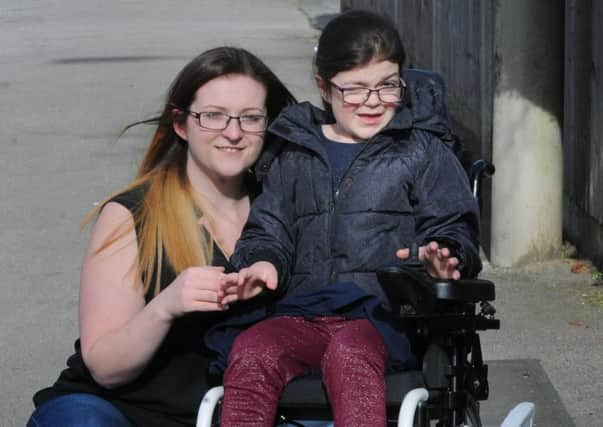My daughter may die due to funds axe


From this week, patients with some incredibly rare conditions could be denied free access to new medicines and treatments because they are not cost effective.
The move has left borough mum Megan Stringer fearing her daughter Jessica may miss out on life-changing treatments in the future, therefore condemning her, and others, to an early death.
Advertisement
Hide AdAdvertisement
Hide AdSeven-year-old Jessica suffers from the life-limiting and ultra-rare condition Mucopolysaccharidosis Type 1 Hurlers (MPS1H).
It affects her body in several debilitating ways and, with no cure, the youngster requires daily medication and has undergone extensive medical procedures, including a bone marrow transplant.
The Leigh Central Primary School pupil has shown remarkable bravery to get her to the current state of stability.
To date, her treatments have been available on the NHS but, under the new policy, families may face footing the bill for expensive private treatments as health services deem them to be too specialised.
Advertisement
Hide AdAdvertisement
Hide AdMum Megan said: “Is it fair that I must explain to my daughter and her brothers and sisters that even though there could be available treatment, Jessica will not be able to access or benefit from it, because it was decided people with ultra-rare disease don’t have the same basic human rights as those who aren’t diagnosed with a rare disease?
“At some point in the future Jessica’s disease is such that she will regress in all areas of life, with this proposal, I must ask more questions; what treatment will be available to her at this time?
“Will these new decisions and proposals mean that she might not be able to access any treatment, which is approved in other countries and showing promising results?
“It surely cannot be acceptable to decide an all-inclusive costing strategy when scientific innovations are at an all-time high and when clinical trials are being better managed and are more readily available.”
Advertisement
Hide AdAdvertisement
Hide AdMegan has started an online petition to highlight Jessica’s plight and has called on Leigh MP Andy Burnham to raise the issue in Parliament.
The decision by NHS England and the National Institute for Health and Care Excellence (Nice) has been criticised by the Society of Mucopolysaccharide Diseases (MPS) of which the Stringer family are members.
The group is calling for a pause on the implementation of the new guidelines so it can be placed under scrutiny by MPs.
Chief executive Christine Lavery said: “At this moment in time highly specialised therapies that have already been approved by NHS England or Nice are unaffected however we do not know if this is the start of the slippery slope.
Advertisement
Hide AdAdvertisement
Hide Ad“The catastrophic issue at this moment in time is that from this month all new highly specialised technologies not yet approved won’t be because Nice and NHS England have introduced a QALY (Quality Adjusted Life Years) limit of £300,000 to appraising all ultra-rare diseases when they know that a QALY of at least £500,000 would be needed for any future highly specialised therapy to be funded (for ultra-rare diseases).
“This removes any hope of children with ultra-rare diseases benefitting from new drug development going forward.
“This decision is punishing some of the most vulnerable in English society. Whilst the cost of the drug may be high, the numbers of children like Jessica with MPSI are about five per year.
“How can it be right that a child can be left to deteriorate and die because they have an ultra-rare disease?”
Advertisement
Hide AdAdvertisement
Hide AdMegan, 25, of Holden Road, Leigh, added: “Under the new proposal, if medicines like the one that saved Jessica’s life when she was a baby, Aldurazyme, was brought forward as a new therapy option, it would not be allowed to be introduced as it would not be approved for reimbursement, due to its cost.
“Its effectiveness would have no impact on the decision as to whether it would be funded or reimbursed.
“It’s heart-breaking and emotionally traumatic to think that my daughter and others with ultra-rare diseases will be condemned to an early death, over funding cuts.”
The policy change will see a new fast-track option “for appraising treatments which offer exceptional value for money” meaning patients will receive access to some treatments five months faster, health bosses have said.
Advertisement
Hide AdAdvertisement
Hide AdHowever, this cost effective measure will mean treatments, such as those for rare conditions like Jessica’s, will fall foul of the budget impact test.
Sir Andrew Dillon, chief executive at NICE, said: “Only a minority of drugs will be affected by the budget impact test and the number will be further reduced where savings generated by the drug’s use will bring its budget impact below £20m. For NICE to agree to an NHSE request to extend implementation of a new drug beyond the usual 90 days, a clear case will have to be made including how funding will be made available from the start, to phase in access to treatment. We have a number of meetings scheduled with industry at which we will be able to address their concerns.”